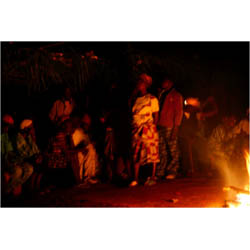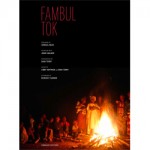Posts in this series:
Raindance 2011- Another Earth to open Raindance
- 18 World Premieres at Raindance
- Festival Preview: 10 Unmissable Raindance Films
- Another Earth
- Interview – Raindance Founder, Elliot Grove
- Skinning (Šišanje)
- Black Pond
- Fambul Tok
- Interview – Fambul Tok Producer, Libby Hoffman
- Hollow
- Amnesty (Amnistia)
- How To Start A Revolution
- Mesocafe
- By Day and By Night (De Dia y De Noche)
- The Box
- Victims
- Interview – Leaving Baghdad Director, Koutaiba Al-Janabi
- Leaving Baghdad
- Bonsai
- Face to Face
- The Ballad of Des and Mo
- Forget Paris
- No Return (Sin retorno)
- Holy Rollers
- The Wedding Party
- War Games
- Scenes of a Crime
- The Fifth Commandment (El Quinto Mandamiento)
- State of Emergency
- Top Ten: Raindance Films
Released: 2011
Director: Sara Terry
Starring: John Caulker
An unexpectedly uplifting look at grassroots reconciliation in Sierra Leone
In my old job I worked with survivors of the Holocaust and subsequent genocides in Bosnia and Rwanda. I was always struck by their dignity, desire to rebuild their lives and the lack of desire for revenge. I’m almost certain that I wouldn’t have the strength of mind or spirit to move on with my life and I’m always amazed by those who do. It was this interest in survival which brought me to Fambul Tok, one of the documentaries at this year’s Raindance Film Festival.
Between 1991 and 2002 a deadly civil war raged in the West African nation of Sierra Leone. In 11 years over 2 million people were displaced, hundreds of thousands raped and injured and at least 50,000 killed. Following the end of the war a Truth and Reconciliation Commission was formed and the Special Court for Sierra Leone was established to bring the worst of the perpetrators to justice. So far only 13 men have been indicted on charges of crimes against humanity. For those suspected of “lesser” crimes a blanket amnesty has been issued and these perpetrators are free to carry on with their lives as before, often in the same villages as their victims.
 Fambul Tok is a grassroots initiative, using Sierra Leonean traditions to encourage confessions and forgiveness in a community setting. “Fambul Tok” is Creole for “family talk” and the work of the group is inspired by the custom of villagers sitting around a communal bonfire discussing the day’s events. Fambul Tok invites victims and perpetrators to come together to discuss their experiences and find a way of moving forward in order to benefit the whole community. Central to the success of the programme is an admittance of guilt and display of genuine remorse by the guilty party and an act of forgiveness from the people who have been wronged. This allows the community to once again live in peace with mutual trust re-established.
Fambul Tok is a grassroots initiative, using Sierra Leonean traditions to encourage confessions and forgiveness in a community setting. “Fambul Tok” is Creole for “family talk” and the work of the group is inspired by the custom of villagers sitting around a communal bonfire discussing the day’s events. Fambul Tok invites victims and perpetrators to come together to discuss their experiences and find a way of moving forward in order to benefit the whole community. Central to the success of the programme is an admittance of guilt and display of genuine remorse by the guilty party and an act of forgiveness from the people who have been wronged. This allows the community to once again live in peace with mutual trust re-established.
To Western ears this at first seems to be an overly simplistic and possibly unrealistic idea, however to think this way is to display a lack of understanding of Sierra Leone’s history, culture and traditions. The phrase “there is nowhere to throw a bad child” is used several times during the film and we are told that there were no prisons in the country until the arrival of colonial powers. Apologies and rehabilitation is more in keeping with the nation’s tradition than Western ideas of punishment and retribution.
 The documentary follows human rights activist and founder of Fambul Tok, John Caulker, as he travels to villages across Sierra Leone attempting to establish local reconciliation schemes. Caulker is definite that both perpetrators and victims must be willing to participate in order for the process to work. He is also quick to point out that Fambul Tok is not a grant-giving aid agency – no money is handed out. Instead, the aim is create a sustainable way for villagers to work together in the future to ensure economic progress.
The documentary follows human rights activist and founder of Fambul Tok, John Caulker, as he travels to villages across Sierra Leone attempting to establish local reconciliation schemes. Caulker is definite that both perpetrators and victims must be willing to participate in order for the process to work. He is also quick to point out that Fambul Tok is not a grant-giving aid agency – no money is handed out. Instead, the aim is create a sustainable way for villagers to work together in the future to ensure economic progress.
We witness a number of campfire confrontations including a girl accusing her uncle of rape and a man who murdered his best friend’s father in an attack which also left his friend permanently disabled. What struck me was the speed with which forgiveness was given. Victim and perpetrator hug each other and dance together only moments after the crime is first revealed. I’m not sure I completely understand how it is possible in the circumstances but it seems to be working for the individuals involved.
The most horrific story we hear is that of Tamba Joe who killed 17 members of his own village including babies and children. Tamba’s sister, Naomi, is heart-breaking as she seeks forgiveness for her brother’s actions and acceptance back into the village family. Tamba Joe is never seen and it’s sad to leave the village not knowing if closure can ever be found.
The film is beautifully shot by first-time director Sara Terry who uses her photographic expertise to stunning effect. The use of light, shadows and the crackling colours of the bonfires nicely complement the dialogue and action taking place.
Fambul Tok is a deeply moving but unexpectedly optimistic look at the damage caused to individuals, families and communities by the civil war in Sierra Leone and how grassroots efforts based on local traditions are helping to heal the wounds left behind. I left the cinema hopeful that Sierra Leone could move forward with the help of initiatives such as this and wondering what we in the”civilised” West could learn from Fambul Tok.

